Linnaeus ECO-TECH 2016 Kalmar, Sweden, November 21-23, 2016
19
MICROPLASTCS THROUGH THE LENSES OF
ECO-INNOVATION
Rune Aardal Hansen¹
Allan Gross¹
¹Aarhus University, Denmark
Abstract
Microplastic represents one of the largest anthropogenic environmental challenges to date and in the future. Constituting a problem with many severe challenges, e.g. microplastic can accumulate across the food chain positioning all living organisms in risk of pollution. Estimations show that between 4.8 and 12.7 million tonnes of plastic entering oceans anually and between 100 and 250 million tonnes might be accumulated in oceans by 2025. Eco-innovation can be a solution to these obstacles. This paper presents how eco-innovations can impose a sustainable plastic production initiative by providing tools for rigorous environmental focus both operational and strategic.
Various approaches have been utilized within eco-innovation. We utilised the eco-compass by Fussler, which consists of a six dimensional hexagon (figure 1), surrounding business operations, constituting a holistic representation of important environmental concern. Some of the core elements the hexagon covers: Mass or material intensity, Energy intensity, Service extension, and Resource conservation – it involves concepts to stimulate the reduction, reuse and recycling of materials required on all levels of business operations.
Plastic is used in large selection of products. Figure 2 shows examples of plastic wrapping as a natural part of a product delivery and experience. We have shown that Eco-innovation provides the ability of a business to focus its operations within the eco-compass hexagon by:
- Attention to a future business landscape with scarcer resources
- Being solution-oriented as it enables businesses to the challenges of tomorrow
- Proactively moving towards a anchoring of eco initiatives that increases manoeuvrability
Innovations must have the perspective to provide smaller pressure on the environment instead of just focusing on the market.
Eco-innovation enables innovation(s) that are sustainable in a larger perspective. The eco-compass provides much needed perspective to future business practise. However, eco-innovation is challenged by prevailing business regime – short-term financial goals.
Figure 1 - elements encompassing eco-compass
